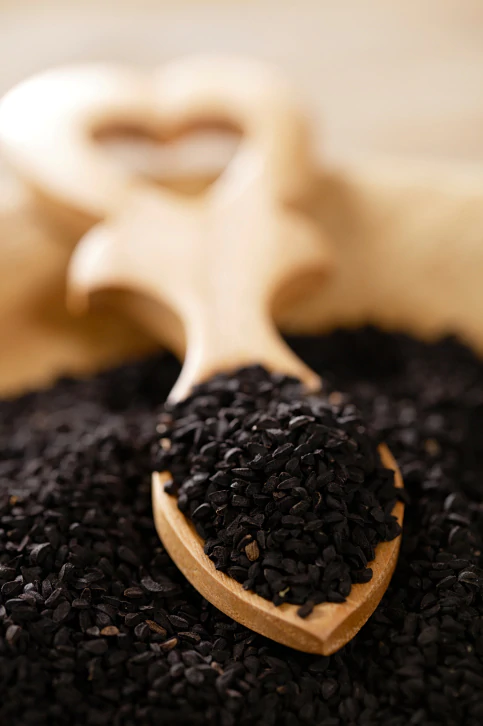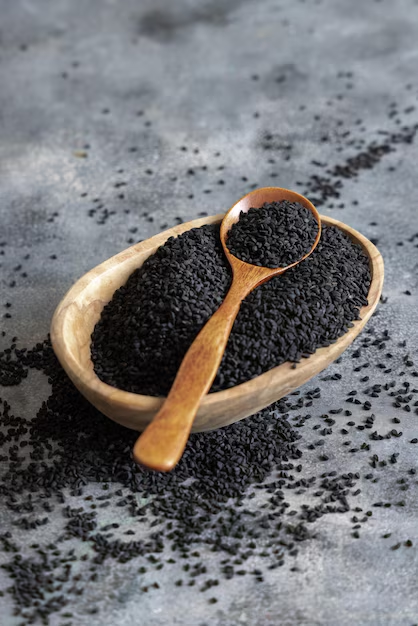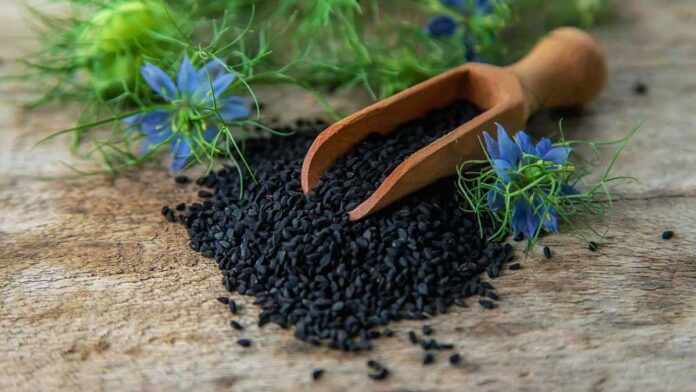INTRODUCTION:
Onion seeds are the small, black or dark brown seeds obtained from the onion plant (Allium cepa). These seeds are used primarily for cultivation to grow new onion plants, which are widely cultivated for their edible bulbs and green shoots. Onions are one of the most important vegetable crops globally, valued for their distinctive flavor, nutritional benefits, and culinary versatility.Onion seeds are typically sown in nurseries or directly in the field, depending on the growing season and climate.

English — Onion seeds
Hindi — प्याज के बीज (Pyaaz ke Beej)
Bengali — পেঁয়াজের বীজ (Peyajer Beej)
Tamil — வெங்காய விதைகள் (Vengaya Vithaigal)
Telugu — ఉల్లిపాయ గింజలు (Ullipaya Ginjalu)
Kannada — ಉಳ್ಳಿಗೆ ಬೀಜಗಳು (Ullige Beejagalu)
Marathi — कांद्याचे बियाणे (Kandyache Biyane)
Gujarati — ડુંગળીના બીજ (Dungli na Beej)
Punjabi — ਪਿਆਜ਼ ਦੇ ਬੀਜ (Piaz de Beej)
Urdu — پیاز کے بیج
Arabic — بذور البصل (Buthur al-basal)
HEALTH BENEFITS:

Antioxidant Power:
Onion seeds contain thymoquinone (TQ) and other antioxidants that combat free radical damage, protecting cells from harm and strengthening the immune system.
Heart Health:
Their compounds can help lower LDL (“bad”) cholesterol and increase HDL (“good”) cholesterol, while also managing blood pressure levels.
Digestive Health:
Onion seeds stimulate digestive enzymes and promote healthy gut bacteria, which aids in better digestion and can relieve constipation.
Bone Strength:
They are a good source of calcium and other minerals vital for maintaining strong bones, potentially reducing the risk of osteoporosis.
Anti-inflammatory Effects:
The anti-inflammatory properties of onion seeds may help alleviate symptoms related to arthritis, asthma, and other inflammatory conditions.
Diabetes Support:
Onion seed extract has shown potential in managing diabetes by improving insulin sensitivity and regulating blood sugar levels.
Strengthens Hair:
The high sulfur content in onion seeds provides amino acids needed for keratin, the primary protein in hair, leading to stronger strands.
Promotes Growth:
Essential oils and compounds like thymoquinone in onion seeds nourish the scalp, encourage healthy hair growth, and combat stress-induced hair loss.
Adds Shine and Moisture:
Regular use of onion seed oil can add natural moisture and shine to hair, making it look healthier.
Fights Scalp Infections:
Onion seeds possess antifungal and antibacterial properties, which help prevent scalp infections that can lead to hair fall.
SIDE EFFECTS:

Gastrointestinal issues:
Excessive intake may cause stomach discomfort, bloating, or heartburn, especially if eaten raw.
Blood clotting:
Onions, including the seeds, may have blood-thinning properties. People with bleeding disorders or those taking anticoagulant medications should consult a doctor before using them in large amounts.
Lowered blood sugar:
They may lower blood sugar levels. Individuals with diabetes should monitor their blood sugar if they use onion seeds for medicinal purposes.
Gastrointestinal discomfort:
Large quantities may cause digestive issues like gas, bloating, and diarrhea.
Pregnancy risk:
High, medicinal doses of kalonji are considered unsafe during pregnancy as they may stimulate uterine contractions. Normal food quantities are generally considered safe.
HOW TO USE:
Spice in Cooking
Use onion seeds (often called kalonji or nigella seeds if you’re referring to a similar black seed) as a spice in Indian, Middle Eastern, or Mediterranean dishes.
They add a slightly oniony, nutty, and peppery flavor.

Tempering/Tadka
Heat oil or ghee, add onion seeds until they crackle, then pour over dals (lentils), vegetables, or curries for flavor.
Baking
Sprinkle on breads, rolls, or crackers for an onion-flavored crunch.
Pickling
Use in pickling spices for added aroma and taste.
Medicinal & Health Uses:
Sometimes onion seeds are used in traditional remedies (check with a healthcare professional first) for digestive issues or inflammation.
Gardening
If you meant onion planting seeds:
Sow them in well-drained soil, keep moist, and in a sunny spot. Thin seedlings to avoid overcrowding.
Precautions
Start with small amounts to check for allergies or digestive sensitivity.
Avoid excessive consumption.
Consult a doctor if pregnant, breastfeeding, or on medication. Use quality seeds for planting and handle carefully to avoid skin irritation




